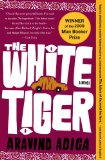Summary | Excerpt | Reading Guide | Reviews | Beyond the Book | Readalikes | Genres & Themes | Author Bio

Critics' Opinion:
Readers' Opinion:
First Published:
Apr 2008, 288 pages
Paperback:
Oct 2008, 304 pages
 Book Reviewed by:
Book Reviewed by:
Sarah Sacha Dollacker
Buy This Book
(For this land, India, has never been free. First the Muslims, then the British bossed us around. In 1947 the British left, but only a moron would think that we became free then.)
Now the foreigners have long abandoned the Black Fort, and a tribe of monkeys occupy it. No one else goes up, except for a goatherd taking his flock to graze there.
At sunrise, the pond around the base of the fort glows. Boulders from the walls of the fort have rolled down the
hill and tumbled into the pond, where they lie, moist and half submerged in the muddy water, like the snoozing hippopotamuses that I would see, many years later, at the National Zoo at New Delhi. Lotuses and lilies float all over the pond, the water sparkles like silver, and the water buffalo wades, chewing on the leaves of the lilies, and setting off ripples that spread in big V's from her snout. The sun rises over the buffalo, and over my father, and over me, and over my world.
Sometimes, would you believe, I almost miss that place.
Now, back to the poster --
The suspect was last seen wearing blue checkered polyester shirt, orange polyester trousers, maroon color sandals...
"Maroon color" sandals -- ugh. Only a policeman could have made up a detail like that. I flatly deny it.
"Blue checkered polyester shirt, orange polyester trousers"...er, well, I'd like to deny those too, but unfortunately they're correct. Those are the kinds of clothes, sir, that would appeal to a servant's eye. And I was still a servant on the morning of the day this poster was made. (By the evening I was free -- and wearing different clothes!)
Now, there is one phrase in this poster that does annoy me -- let me go back to it for a moment and fix it:
...son of Vikram Halwai rickshaw-puller...
Mr. Vikram Halwai, rickshaw-puller -- thank you! My father was a poor man, but he was a man of honor and courage. I wouldn't be here, under this chandelier, if not for his guidance.
In the afternoons, I went from my school to the tea shop to see him. This tea shop was the central point of our village; the bus from Gaya stopped there at noon every day (never late by more than an hour or two) and the policemen would park their jeep here when they came to bugger someone in the village. A little before sunset, a man circled around the tea shop three times, ringing his bell loudly. A stiff cardboard-backed poster for a pornographic film was tied to the back of his cycle -- what traditional Indian village is complete without its blue-movie theater, sir? A cinema across the river showed such films every night; two-and-a-half-hour fantasias with names like He Was a True Man, or We Opened Her Diary, or The Uncle Did It, featuring golden-haired women from America or lonely ladies from Hong Kong -- or so I'm guessing, Mr. Premier, since it's not like I ever joined the other young men and went to see one of these films!
The rickshaw-pullers parked their vehicles in a line outside the tea shop, waiting for the bus to disgorge its passengers.
They were not allowed to sit on the plastic chairs put out for the customers; they had to crouch near the back, in that hunched-over, squatting posture common to servants in every part of India. My father never crouched -- I remember that. He preferred to stand, no matter how long he had to wait and how uncomfortable it got for him. I would find him shirtless, usually alone, drinking tea and thinking.
Then there would be the honk of a car.
The hogs and stray dogs near the tea shop would scatter, and the smell of dust, and sand, and hog shit would blow into the shop. A white Ambassador car had stopped outside. My father put down his teacup and went out.
Copyright © 2008 by Aravind Adiga




Everywhere I go, I am asked if I think the university stifles writers...
Click Here to find out who said this, as well as discovering other famous literary quotes!
Your guide toexceptional books
BookBrowse seeks out and recommends the best in contemporary fiction and nonfiction—books that not only engage and entertain but also deepen our understanding of ourselves and the world around us.